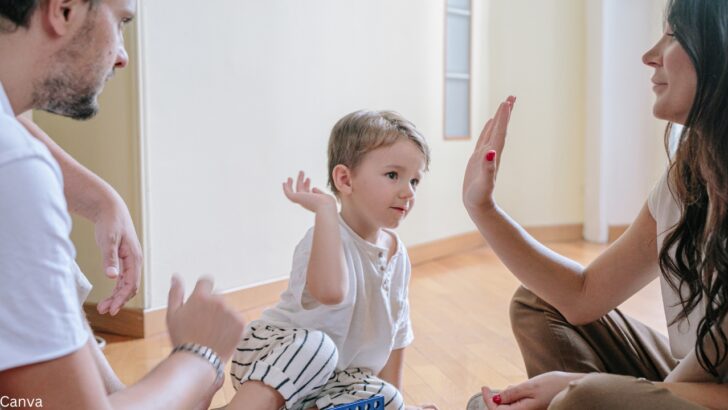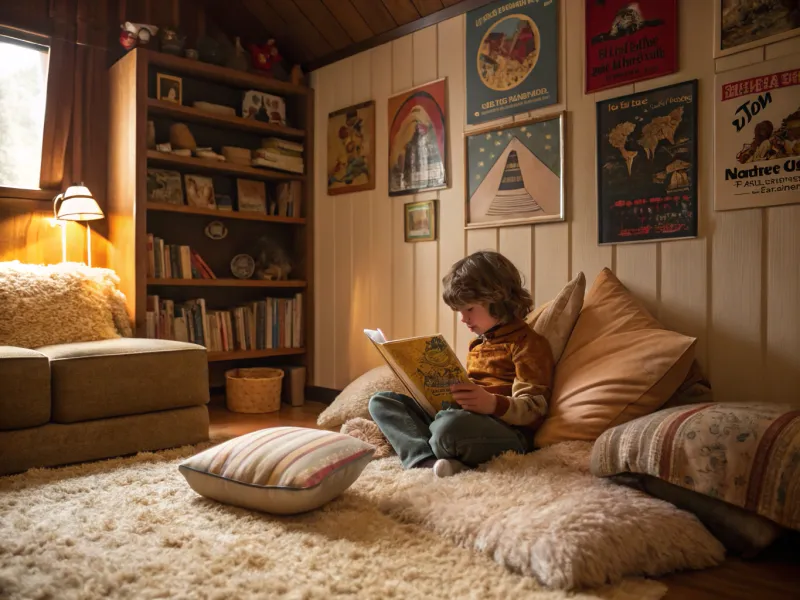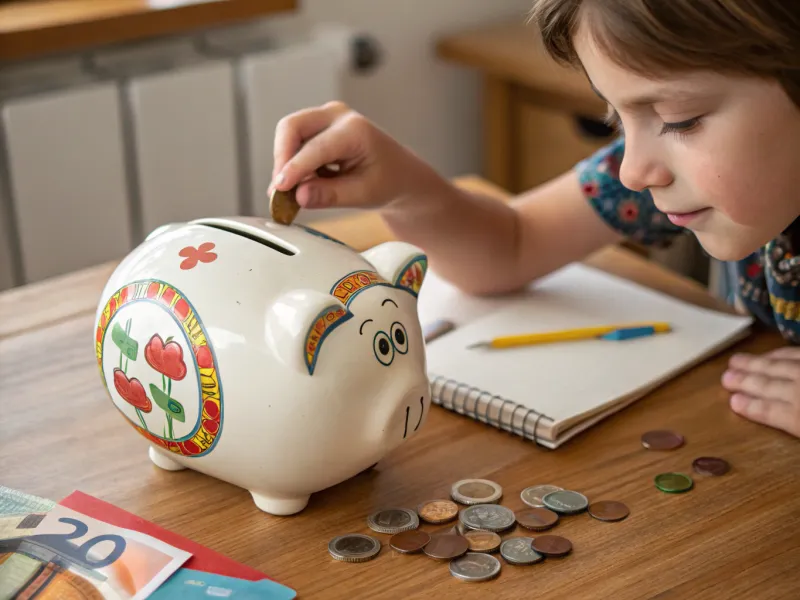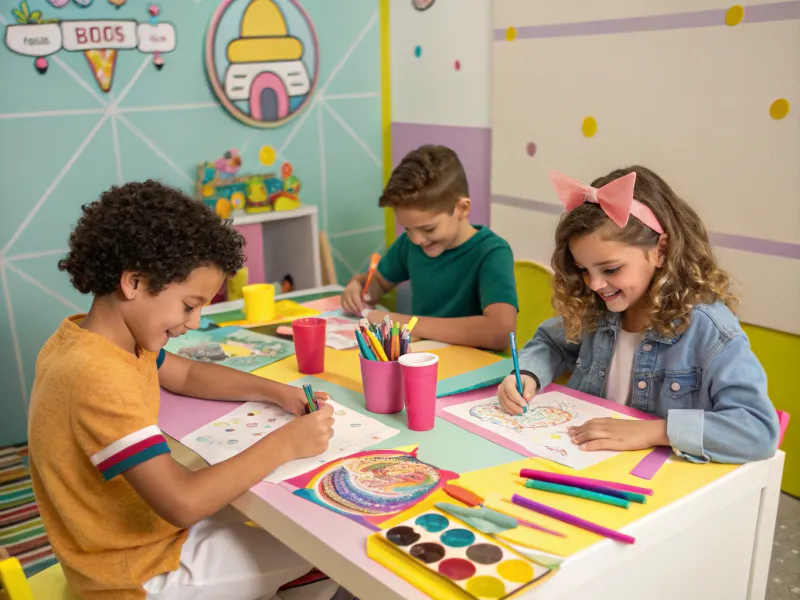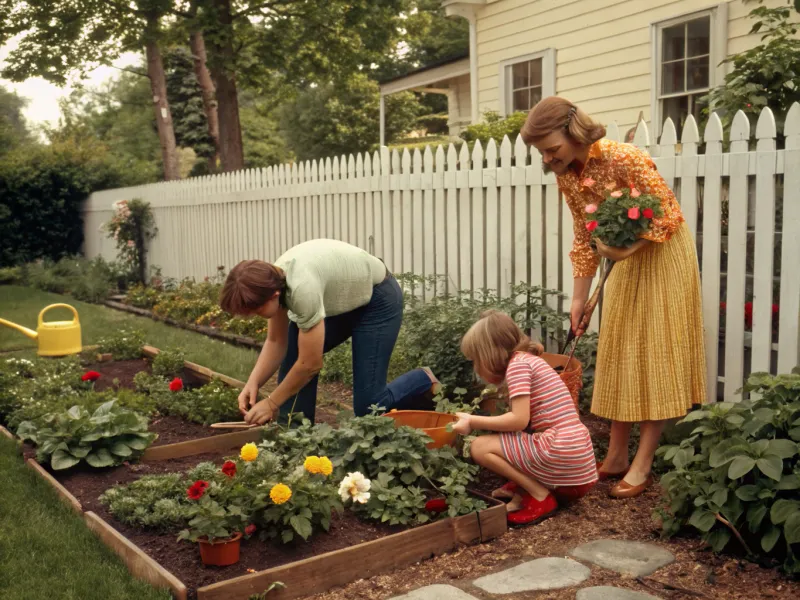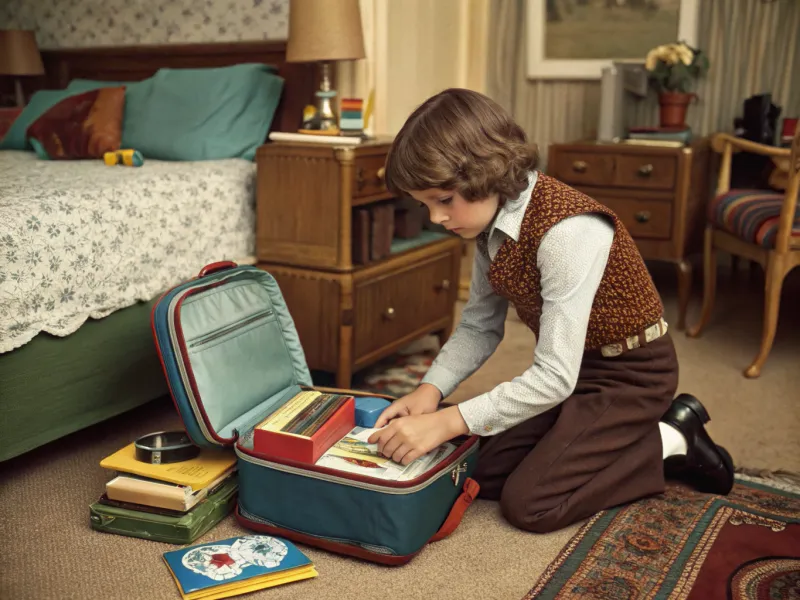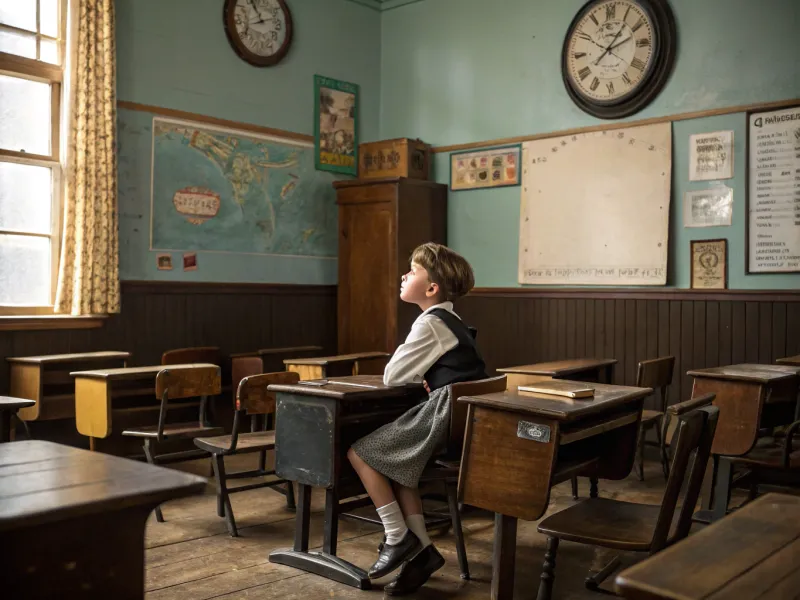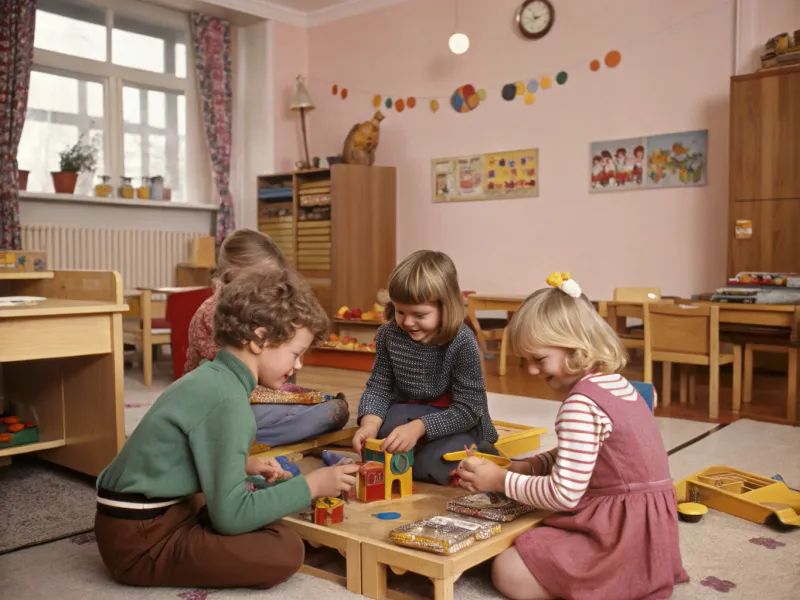Ser pai ou mãe pode ser uma aventura louca, não acha? Embora as técnicas modernas estejam na moda, por vezes as boas e velhas maneiras são exatamente o que precisamos.
Neste blogue, vamos fazer uma pequena viagem ao passado para explorar alguns métodos parentais da velha guarda que ainda hoje são altamente recomendados pelos especialistas.
Estes métodos podem ter sido utilizados pelos nossos avós, mas resistiram ao teste do tempo e continuam a ter lições valiosas para nós.
1. Jantares de domingo em família
Todos os domingos, os meus avós juntavam toda a família para um jantar grande e farto. Mas é mais do que apenas comida, não é? É uma questão de ligação. Sentarmo-nos à mesa, partilharmos histórias da semana e estarmos presentes uns com os outros é algo de que precisamos mais do que nunca.
Os jantares de domingo em família podem ser um santuário do caos da semana. Não se trata de ser chique ou extravagante. Tem a ver com o calor de estarmos juntos, ouvirmos e termos aquelas conversas mais profundas que muitas vezes pomos de lado durante a semana. Pense nisto como um ritual semanal que fortalece os laços familiares de uma forma que nada mais consegue.
Com os horários de todos a tornarem-se cada vez mais agitados, reservar este momento especial permite que as crianças se sintam valorizadas e ouvidas. Por isso, prepare os seus pratos favoritos ou experimente algo novo; o objetivo é desfrutar da companhia uns dos outros. Ficará surpreendido com o quanto estes momentos são apreciados e recordados.
2. Histórias de embalar
Lembra-se da magia das histórias de embalar? É uma tradição com que muitos de nós crescemos e que vale a pena transmitir. Enroscar-se com um bom livro e dar largas à imaginação era o ponto alto dos meus serões em criança.
Ler para os seus filhos antes de dormir não é apenas uma atividade divertida. É um momento íntimo que promove a proximidade e cultiva o gosto pela leitura. Estas histórias estimulam a criatividade e a imaginação, proporcionando uma porta de entrada para mundos onde tudo é possível.
Escolha contos que inspirem, ensinem uma lição ou simplesmente entretenham. Deixe que os interesses do seu filho guiem as histórias e veja os seus olhos brilharem de espanto. Esses momentos preciosos, em que se aconchegam juntos, podem tornar-se a pedra angular de memórias de infância muito queridas.
3. Aprender brincando
Brincar é uma parte fundamental da aprendizagem, oferecendo às crianças a oportunidade de explorar, imaginar e compreender o mundo que as rodeia. Os brinquedos tradicionais incentivam a criatividade e a resolução de problemas.
Os pais observam os seus filhos a desenvolver competências cognitivas e sociais através da brincadeira, que também serve como uma óptima oportunidade para criar laços. É uma estratégia que apoia o crescimento emocional e intelectual.
4. As tarefas como lições
Ao envolvermos as crianças nas tarefas domésticas, ensinamos-lhes a responsabilidade e a importância de contribuírem para a unidade familiar.
Quando as crianças participam nas tarefas, aprendem competências valiosas que lhes serão úteis muito para além da infância.
Os especialistas recomendam tarefas adequadas à idade para criar confiança e ensinar competências para a vida. Desde fazer a cama até ajudar a lavar a loiça, estas tarefas promovem a independência e a autodisciplina. Desta forma, as crianças também aprendem a arte do trabalho de equipa e da cooperação, competências essenciais em todas as esferas da vida.
5. Brincadeiras ao ar livre
Lembra-se de passar horas intermináveis a brincar ao ar livre até que as luzes da rua se acendessem? Era aí que a aventura e a imaginação ganhavam verdadeiramente vida. Há algo de mágico nas brincadeiras não estruturadas que não pode ser reproduzido dentro de casa.
Incentivar as crianças a brincar no exterior não significa apenas mantê-las entretidas. Trata-se de as deixar explorar o seu ambiente, ganhar força física e desenvolver competências sociais. A liberdade de correr, saltar e rir sem restrições é inestimável.
Estimula a curiosidade, fomenta a criatividade e é uma forma fantástica de as crianças aprenderem competências de resolução de problemas de forma natural. Além disso, é uma excelente oportunidade para interagirem com os colegas e aprenderem a dinâmica do trabalho em equipa e da negociação. Por isso, deixe as crianças sujarem-se, conhecerem novos amigos e descobrirem o mundo que as rodeia. O ar fresco e o ambiente natural são os melhores cenários para as aventuras da infância.
6. Noite de jogos em família
Estes encontros podem ser uma pausa dos nossos ecrãs digitais, oferecendo uma oportunidade para criar laços e estabelecer ligações através do riso e da competição amigável. Quer se trate de um jogo de Monopólio ou de charadas, o objetivo é interagir uns com os outros num ambiente divertido e descontraído.
Os especialistas defendem as noites de jogos como uma ferramenta de desenvolvimento social. Incentivam a comunicação, o pensamento crítico e o trabalho de equipa. Além disso, são uma forma fantástica de descontrair e desestressar em família. Escolha jogos de que todos gostem e talvez até experimente algo novo.
O que importa é o tempo de qualidade passado em conjunto, reforçando os laços familiares com cada lançamento de dados ou jogada de uma carta.
7. Ênfase nas boas maneiras
Lembra-se de ser ensinado a dizer "por favor" e "obrigado", ou a segurar a porta aos outros? Ensinar boas maneiras tem a ver com respeito e gentileza.
As crianças que aprendem boas maneiras desde cedo crescem a compreender a importância de tratar os outros com consideração. Estabelece as bases para interações sociais positivas e aumenta a confiança em vários contextos.
Os especialistas sugerem que incutir boas maneiras ajuda as crianças a navegar em cenários sociais de forma mais eficaz. Não se trata apenas de etiqueta; trata-se de fomentar a empatia e a compreensão. Ensinar boas maneiras não tem de ser rígido ou severo. Pode ser um processo divertido e envolvente, através de dramatizações ou de lembretes suaves. O objetivo é criar um ambiente respeitoso e harmonioso onde todos se sintam valorizados e reconhecidos.
8. Tempo de ecrã limitado
Enquanto crescia, o tempo de ecrã era um privilégio, não um direito. Limitar o tempo de ecrã não significa privar as crianças de entretenimento - significa incentivá-las a envolverem-se com o mundo que as rodeia.
Na atual era digital, é fácil deixar que os ecrãs assumam o controlo, mas é fundamental estabelecer limites. Os especialistas salientam a importância de equilibrar o tempo de ecrã com outras actividades que promovam o bem-estar físico, mental e emocional.
Ao restringir a utilização dos ecrãs, as crianças são encorajadas a explorar passatempos, a passar tempo ao ar livre e a cultivar relações na vida real. É tudo uma questão de moderação e de garantir que a tecnologia complementa, em vez de dominar, a vida familiar. Com limites claros, as crianças aprendem a apreciar o valor de diversas actividades, o que leva a uma educação mais equilibrada.
9. Respeito pelos mais velhos
Na minha família, respeitar os mais velhos não era negociável. Tratava-se de ouvir, valorizar as suas palavras e aprender com as suas experiências. Este respeito é a pedra angular de muitas culturas e continua a ter um valor imenso atualmente.
Ensinar as crianças a respeitar os mais velhos incute-lhes humildade e reconhecimento da sabedoria que vem com a idade. Trata-se de compreender que as gerações mais velhas têm muito para oferecer em termos de lições de vida e perspectivas.
Os especialistas afirmam que respeitar os mais velhos pode fomentar a empatia e aprofundar os laços familiares. Esta prática não só enriquece a sua compreensão, como também ajuda a preservar a história e as tradições familiares, criando um sentimento de continuidade e de pertença.
10. Refeições caseiras
Há algo de especial numa refeição caseira, não há? O aroma que sai da cozinha, o calor de um prato confeccionado com amor - é uma experiência que vai para além do mero sustento.
Preparar refeições em casa permite que as famílias se unam em tarefas partilhadas e desfrutem em conjunto dos frutos do seu trabalho. É uma oportunidade para ensinar as crianças sobre nutrição, competências culinárias e a alegria de partilhar comida.
Os especialistas defendem as refeições caseiras como uma forma de promover hábitos alimentares saudáveis e a união da família. Não se trata apenas da comida - trata-se das conversas e dos risos que acontecem à volta da mesa de jantar.
11. Incentivar a leitura
Os livros foram para mim, em criança, uma porta de entrada para aventuras sem fim. Incentivar o gosto pela leitura abre um mundo de imaginação e conhecimento para as crianças.
A leitura não é apenas um exercício académico; é um passatempo agradável que pode ser simultaneamente divertido e educativo. Desde histórias cativantes a textos informativos, os livros oferecem uma grande variedade de benefícios.
É uma fuga serena da azáfama da vida quotidiana, proporcionando às crianças estímulo mental e relaxamento. Incentive a leitura introduzindo uma variedade de géneros e deixando as crianças escolherem o que lhes interessa.
Crie recantos de leitura acolhedores e partilhe histórias em conjunto para que esta seja uma atividade apreciada. Num mundo de ecrãs, perder-se num livro é uma dádiva preciosa.
12. Passeios e conversas
Caminhar em conjunto proporciona um ambiente descontraído onde as crianças se sentem à vontade para exprimir os seus pensamentos e sentimentos. É uma forma maravilhosa de se relacionarem e desfrutarem da companhia uns dos outros sem distracções.
Os especialistas recomendam as caminhadas como uma oportunidade de diálogo aberto e de atividade física. É uma oportunidade para se desligar e interagir com o que o rodeia, promovendo o bem-estar físico e mental. Quer se trate de um passeio pelo parque ou de uma caminhada na natureza, estes momentos incentivam a união e a reflexão em família.
Por isso, calce os ténis e dê um passeio - é o cenário perfeito para conversas de coração para coração.
13. Poupar para o futuro
O conceito de poupança foi-me incutido desde tenra idade. Lembro-me do entusiasmo de deixar cair moedas no meu mealheiro e de o ver encher.
Ensinar as crianças a poupar dinheiro ajuda-as a compreender o valor do trabalho árduo e da gratificação adiada. Trata-se de estabelecer objectivos e construir uma base para a responsabilidade financeira.
Trata-se de fomentar uma mentalidade que dá prioridade a gastos e planeamento ponderados. Torne a poupança divertida para as crianças, utilizando ajudas visuais como gráficos ou frascos que registam os seus progressos.
Esta prática não só os dota de competências essenciais para a vida, como também promove um sentimento de realização ao verem as suas poupanças crescerem. Nunca é demasiado cedo para começar a preparar as crianças para um futuro financeiramente seguro.
14. Aprender através da natureza
A aprendizagem através da natureza proporciona às crianças experiências práticas que são simultaneamente educativas e estimulantes. Incentiva a curiosidade e uma apreciação mais profunda do ambiente.
Os especialistas destacam os benefícios da aprendizagem ao ar livre para o desenvolvimento cognitivo e a criatividade. A natureza oferece infinitas oportunidades de exploração e descoberta.
Incentive as crianças a fazerem perguntas, a observarem o que as rodeia e a envolverem-se com o mundo natural. Quer seja através de jardinagem, caminhadas ou simplesmente brincadeiras ao ar livre, estas experiências fomentam um amor duradouro pela aprendizagem e pela natureza.
15. Elaborar e criar
A prática de trabalhos manuais permite que as crianças se expressem e desenvolvam capacidades motoras finas. É uma porta de entrada para a criatividade e a resolução de problemas.
Os especialistas defendem o artesanato como um meio de aumentar a imaginação e a destreza. Encoraje as crianças a explorar diferentes materiais e técnicas e deixe a sua criatividade correr à solta.
O artesanato não tem apenas a ver com o produto final; tem a ver com o processo e a alegria de fazer algo único. É uma forma maravilhosa de passar tempo de qualidade em conjunto, fomentando tanto as capacidades como as memórias partilhadas.
16. Celebrações tradicionais
As festas de fim de ano foram sempre um grande acontecimento na minha família. A emoção de preparar, decorar e festejar em conjunto era inigualável.
As celebrações tradicionais constituem uma oportunidade para transmitir costumes e criar memórias duradouras. Reúnem a família e os amigos numa união alegre.
Os especialistas sublinham a importância das tradições no reforço dos laços familiares e da identidade cultural. Oferecem um sentimento de continuidade e de pertença. Incentive as crianças a participarem no planeamento e na execução das actividades festivas.
Quer se trate de cozinhar doces de Natal ou de fazer decorações, estes rituais ocupam um lugar especial na história da família. Celebre o antigo e abrace a criação de novas tradições que reflictam os valores únicos da sua família.
17. Sessões de narração de histórias
Reunirmo-nos para contar histórias era uma tradição muito apreciada na minha família. A arte de tecer contos, quer da história quer da imaginação, era cativante.
Contar histórias estimula a imaginação e a capacidade de ouvir. É uma forma consagrada pelo tempo de partilhar sabedoria e entreter.
Os especialistas elogiam a narração de histórias como uma ferramenta poderosa para o desenvolvimento da língua e a preservação cultural. É uma oportunidade para transmitir histórias de família, folclore ou contos imaginativos. Incentive as crianças a contar as suas próprias histórias, fomentando a criatividade e a confiança.
As noites de contos podem tornar-se uma tradição querida, oferecendo tanto entretenimento como valor educativo. São momentos em que a imaginação não tem limites e os laços familiares são reforçados.
18. Jardinagem em conjunto
A jardinagem em conjunto ensina as crianças sobre a natureza, a responsabilidade e a paciência. É uma forma prática de se relacionar com a terra e aprender sobre sustentabilidade.
Os especialistas defendem a jardinagem como uma atividade educativa e terapêutica. É uma oportunidade para ensinar às crianças o ciclo de vida das plantas e a importância de cuidar delas.
Incentive as crianças a plantar as suas próprias sementes e a cuidar delas, testemunhando os frutos do seu trabalho. A jardinagem promove um sentido de realização e apreço pela natureza, e é uma óptima forma de passar tempo de qualidade em família.
19. Música e dança
O envolvimento na música e na dança oferece uma fantástica saída para a expressão e a criatividade. É uma forma de criar laços e de nos divertirmos juntos.
Os especialistas destacam os benefícios da música e da dança para o desenvolvimento emocional e físico. Promove a confiança e a coordenação. Incentive as crianças a explorar diferentes géneros de música e a descobrir o seu próprio ritmo.
Quer se trate de dançar na sala de estar ou de cantar ao som das suas músicas favoritas, estas actividades trazem alegria e ligação. A música e a dança podem tornar-se uma tradição familiar acarinhada, cheia de risos e momentos inesquecíveis.
20. Viagens de campismo
Acampar era uma aventura como nenhuma outra. A emoção de montar uma tenda, cozinhar numa fogueira e dormir sob as estrelas era emocionante.
As viagens de campismo proporcionam uma pausa na rotina e uma oportunidade de contacto com a natureza. Ensinam as crianças a serem auto-suficientes e a apreciarem o ar livre.
Os especialistas recomendam acampar devido aos seus benefícios para promover a resiliência e o trabalho em equipa. É uma oportunidade para se desligar e mergulhar na simplicidade da natureza. Incentive as crianças a participar no planeamento e na montagem do acampamento, desenvolvendo competências e confiança. As experiências partilhadas das aventuras ao ar livre criam laços e memórias duradouras. Quer se trate de um acampamento no quintal ou de uma expedição na montanha, acampar é uma tradição intemporal que promove a união familiar e a exploração.
21. Arte da conversação
As conversas estavam no centro das minhas reuniões familiares. A troca de ideias e perspectivas era um ritual muito apreciado.
Participar em conversas com significado ajuda as crianças a desenvolver competências de comunicação e pensamento crítico. É uma oportunidade para aprender e crescer.
Os especialistas sublinham a importância da conversa no desenvolvimento da linguagem e da inteligência emocional. Incentive as crianças a expressarem-se, a fazerem perguntas e a ouvirem ativamente. Criar um espaço de diálogo aberto promove a compreensão e o respeito. Quer se trate de discutir acontecimentos actuais ou de partilhar experiências pessoais, as conversas aproximam as famílias. São a base para relações fortes e para o crescimento intelectual.
22. Responsabilidade pessoal
Assumir a responsabilidade pelos nossos actos foi uma lição que me foi incutida desde muito cedo. Tratava-se de compreender as consequências e de aprender com os erros.
Ensinar a responsabilidade pessoal ajuda as crianças a desenvolver a responsabilidade e a auto-disciplina. Trata-se de as capacitar para fazerem escolhas informadas.
Os especialistas defendem a promoção da responsabilidade como forma de criar confiança e independência. Incentive as crianças a assumirem a responsabilidade pelas suas tarefas, desde os trabalhos de casa às tarefas domésticas. Fornecer orientação e apoio, permitindo ao mesmo tempo a autonomia, promove o crescimento e a maturidade. A responsabilidade pessoal é uma competência valiosa para a vida que prepara as crianças para os desafios futuros que irão enfrentar.
23. Rotina estruturada
Criar uma rotina diária consistente ajuda as crianças a sentirem-se seguras e a compreenderem a importância da gestão do tempo. Estabelecer horários definidos para as refeições, trabalhos de casa e brincadeiras incute disciplina e previsibilidade.
Os pais consideram que as crianças se desenvolvem bem em ambientes onde sabem o que esperar, reduzindo a ansiedade e promovendo a responsabilidade. Esta abordagem também ajuda a desenvolver competências de gestão do tempo, cruciais para a vida adulta.
24. Valor da paciência
Ensinar a paciência ajuda as crianças a desenvolver o autocontrolo e a perseverança. Trata-se de compreender que as coisas boas levam tempo.
Os especialistas destacam a paciência como uma competência fundamental para o sucesso. Incentive as crianças a praticar a paciência em situações quotidianas, desde esperar numa fila até trabalhar numa tarefa difícil.
Trata-se de criar resiliência e compreender o valor do esforço e do tempo. A paciência é um princípio orientador que ajuda no crescimento pessoal e na realização de objectivos a longo prazo.
25. Importância da partilha
Incentivar a partilha ajuda as crianças a desenvolver empatia e competências sociais. Trata-se de compreender a alegria de dar e receber.
Os especialistas defendem o ensino da partilha como forma de fomentar a empatia e o espírito de comunidade. Incentivar as crianças a partilhar brinquedos, recursos e experiências com amigos e familiares.
Esta prática promove um sentimento de pertença e reforça os laços. A partilha é um aspeto fundamental da construção de relações compassivas e harmoniosas. É uma lição de vida que promove a bondade e o respeito mútuo.
26. Remédios caseiros
Os remédios caseiros eram um elemento básico em minha casa, desde chás calmantes a bálsamos curativos. Eram remédios passados de geração em geração.
A utilização de remédios caseiros ensina as crianças sobre a cura natural e os cuidados pessoais. Trata-se de compreender os benefícios da generosidade da natureza.
Os especialistas destacam o valor dos remédios tradicionais para promover a saúde e o bem-estar. Incentive as crianças a aprenderem sobre as ervas e os ingredientes naturais utilizados nos remédios. Esta prática promove o apreço pelos métodos naturais de cura e pela vida holística. Os remédios caseiros são uma tradição que combina a sabedoria do velho mundo com o cuidado carinhoso. São um testemunho dos recursos e da criatividade das gerações passadas.
27. Escrever cartas
Na era das mensagens instantâneas, a arte de escrever cartas foi quase esquecida. No entanto, há algo de profundamente pessoal e significativo em pôr os pensamentos no papel. Quer se trate de uma nota de agradecimento, de uma carta a um amigo ou de uma mensagem sentida a um avô, escrever cartas ensina às crianças a paciência, a ponderação e a alegria de uma comunicação significativa.
Os especialistas salientam que escrever cartas melhora a literacia, a expressão emocional e as ligações mais profundas. Promove um sentimento de antecipação e apreço quando se recebe uma resposta escrita à mão. Incentivar as crianças a enviar cartas ou mesmo a manter um diário incute o gosto pela narração de histórias e pela autorreflexão - algo que nenhuma mensagem digital pode verdadeiramente substituir.
28. Respeitar o espaço pessoal
Enquanto crescia, ensinaram-me bater à porta antes de entrar no quarto de alguém e a respeitar quando alguém precisava de estar sozinho. Esta lição simples mas crucial ajudou-me a compreender os limites e a importância do espaço pessoal nas relações.
Ensinar as crianças a respeitar o espaço pessoal promove a independência, a inteligência emocional e competências interpessoais saudáveis. Os especialistas sublinham que aprender a dar espaço aos outros para respirar ajuda as crianças a desenvolver a auto-consciência e o respeito pelas necessidades dos outros. Quer se trate de dar a um irmão algum tempo de silêncio ou de compreender quando um pai está ocupado, esta prática constrói relações mais fortes e atenciosas. Além disso, ensina o equilíbrio entre a união e a necessidade de solidão.

